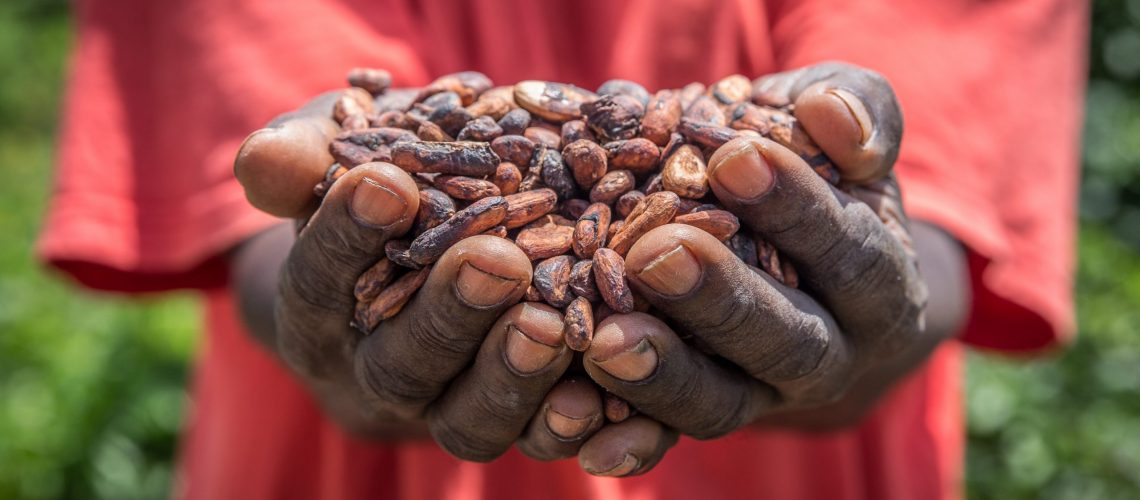For the past three years, Colruyt has been running a pilot project in Côte d’Ivoire, focusing on the living wage of cocoa producers. The lessons learned should enable the supermarket chain to improve the fairness of its Boni-branded chocolates.
Between June 2020 and May 2023, the Colruyt Group ran and financed a pilot project in the San Pedro region of Côte d’Ivoire, with the aim of moving from concept to reality in terms of a living wage for cocoa producers. In practical terms, the Belgian chain has undertaken to buy 100 tonnes of cocoa a year for three years from two communities, Daregba and Colonel, representing a total of 102 farming families who are members of the ECSP (Entreprise Coopérative de Saint Paul) cooperative, at a price higher than the market price. The beans were then used to produce the 72% chocolate bars sold by the supermarket chain under its own Boni brand.
“The basic policy at Colruyt is that all our chocolate bars must be certified: Fairtrade for our Boni bars and Rainforest Alliance for Everyday bars and private label chocolate products,” explains Karen Janssens, sustainable sourcing expert for Colruyt Group. “But we realised that current certifications were not enough to enable producers to achieve a living wage. So, we launched a pilot project focused on this theme, to gain a better understanding of the cocoa value chain, the issues that run through it, and what our role can and cannot be, before finally using this knowledge to ultimately develop another similar project on a larger scale.”
Price, one of many parameters
One of the distinctive features of this project, set up as part of the Beyond Chocolate sectoral initiative and in collaboration with other players throughout the chain, is that it focuses not only on the purchase price of cocoa, but also on five other parameters: productivity, quality, income diversification, access to funding and agroforestry/reforestation. “Throughout the project, various interventions were set up to increase the productivity of the plots,” explains Karen Janssens. “Work has also been done on the quality of the cocoa produced, through centralised fermentation centres set up by Puratos directly in the communities and managed by the ECSP. Freshly harvested cocoa can now be quickly transported to the centre, ensuring even fermentation and therefore enhanced quality. For the farmers involved in the project, better quality means a better price in the form of a premium. Our partner Rikolto (editor’s note: an NGO specialising in agriculture) has worked on access to funding, in particular by organising Village Savings and Loan Associations (VSLA). Farmers were also encouraged to plant trees in exchange for bonuses, while various income diversification projects have been set up, such as growing cassavas, rearing laying hens, etc. Finally, Colruyt was responsible for paying the living income reference price.”

For the 2021/2022 period, this LIRP, i.e. the minimum farmgate price for one tonne of cocoa necessary for a household to meet the needs of its members, was set at 2 200 dollars (in Côte d’Ivoire), and this was achieved thanks to the following price structure paid directly to the producer: an official farmgate price of 1 458 dollars, a minimum Fairtrade price of 122 dollars, a quality premium of 177 dollars, a chocolate bonus of 140 dollars, and Colruyt’s living income premium of 305 dollars – the key unique feature of the project. Note that since its October 2022 update, Fairtrade International has set the LIRP at 2 390 dollars per tonne in Côte d’Ivoire.
Partial failure (or success)
LIRP, increased productivity, additional income… Taken together, these various parameters should enable the project’s cocoa farmers to achieve the living wage estimated by Fairtrade at 5 437 dollars per year for a household of 8 people, by 2022. So, target achieved? “On the one hand, the initial results are very positive, as cocoa farmers’ incomes have risen considerably: +38% in cocoa revenues and +31% in total revenues,” says a delighted Karen Janssens.
“Nevertheless, we have to admit that despite our efforts, their income is still only at 46% of the living wage target for farmers in Côte d’Ivoire.” One of the reasons identified for this partial failure was the fact that not all the cocoa produced by the 102 cocoa farmers during the project period was resold via this channel. As a result, part of this production was sold off at a price below the living income reference price. Another problem was that the average plot size was not large enough to achieve profitability. “On the other hand, the focus on revenue diversification has shown great promise, even though we still don’t have the longer-term data on this point. But it’s clearly an avenue we want to explore in the future.” The end of this pilot project marks the beginning of a new phase. “We intend to extend this model to our other Boni-branded bars. We’re working on this right now, with the aim of having these products on the shelves in 2024.”


